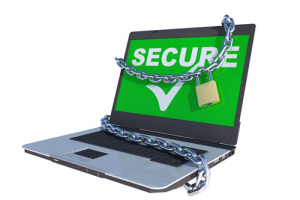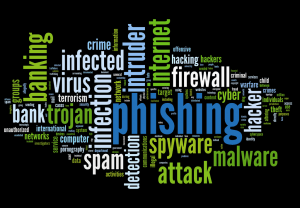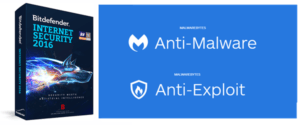Windows Protection
 Windows Protection: a reader asks…
Windows Protection: a reader asks…
I just bought a new Windows 10 laptop PC. Can you tell me the basic things I need to do to protect my computer from hackers?
The most basic thing to do is to use good protection software on a Windows computer. Windows 10 does come with some very basic protection mechanisms, but they really don’t do enough to protect you from today’s threats. For the best protection, you really need three items: Anti-virus, anti-malware, and anti-exploit. Most security suite software (Norton Internet Security, Bitdefender Internet Security,McAfee Total Protection, Kaspersky Internet Security, etc.) is really good at protecting you from computer viruses, worms and trojans, but falls short on much of the other malware and spyware that plague the internet. These companies are continuing to improve their products, but the unfortunate fact is that no one product can currently provide the best all-around protection. So I currently recommend three products. All of these are subscription-based software, so you purchase the rights to use the software for one year at a time:
 Bitdefender Internet Security (+/- $50-$80, shop for deals). The hidden fact about this program is that you can buy older versions at a steep discount and upgrade for free. What you’re buying is a one-year subscription to Bitdefender’s product, and even if you buy the 2015 or earlier versions, once you install and activate them you can download and upgrade to the latest version without additional cost anytime during the subscription period. But you may find that older versions you have may not install on Windows 10, so your strategy is to buy the older version, download and install a free trial version of the current version, and then activate that with your older version’s license key.
Bitdefender Internet Security (+/- $50-$80, shop for deals). The hidden fact about this program is that you can buy older versions at a steep discount and upgrade for free. What you’re buying is a one-year subscription to Bitdefender’s product, and even if you buy the 2015 or earlier versions, once you install and activate them you can download and upgrade to the latest version without additional cost anytime during the subscription period. But you may find that older versions you have may not install on Windows 10, so your strategy is to buy the older version, download and install a free trial version of the current version, and then activate that with your older version’s license key.- Malwarebytes Anti-Malware Premium ($25/year). After you buy and install this software, you should visit the settings and turn on checking for rootkits. Inexplicably, this isn’t turned on by default. Otherwise, this product does a great job at keeping all sorts of malware from infecting your computer.
- Malwarebytes Anti-Exploit Premium ($25/year). This provides a layer of protection for your internet-facing programs (web browsers, email programs, etc.) so that if you visit a website that’s been compromised by hackers, their malware can’t sneak onto your computer.
I think of these three programs as being the bouncers at my very exclusive club – my computer. As a good club manager, you certainly want the biggest and strongest bouncers to keep out the riff-raff, right? Even if you’re on a budget, it’s not worth investing good money in a computer and then not giving it adequate protection.
 Once you’ve done that, the only other protection you need to worry about is yourself – literally! Hackers are constantly dreaming up new ways to fool you into giving them access to your computer, and no protection program will ignore your own instructions, even if they’re bad for security. Think of your bouncers, great at stopping unsavory creatures from entering your club, but they still have to follow your orders. Even if you tell them to allow some nasty group of people in. Hackers will impersonate your bank, your friends, even your boss and try to get you to allow them into your computer – often without you even realizing that’s what you’re doing. So you need to be vigilant and when it comes to your computer, be more than a bit paranoid. I suggest you follow the guidelines I’ve documented in my article “Safe Computing Practices“.
Once you’ve done that, the only other protection you need to worry about is yourself – literally! Hackers are constantly dreaming up new ways to fool you into giving them access to your computer, and no protection program will ignore your own instructions, even if they’re bad for security. Think of your bouncers, great at stopping unsavory creatures from entering your club, but they still have to follow your orders. Even if you tell them to allow some nasty group of people in. Hackers will impersonate your bank, your friends, even your boss and try to get you to allow them into your computer – often without you even realizing that’s what you’re doing. So you need to be vigilant and when it comes to your computer, be more than a bit paranoid. I suggest you follow the guidelines I’ve documented in my article “Safe Computing Practices“.
Lastly, recognize that keeping your computer safe is not a once-and-done job. It’s a continuing and evolving process. The hackers are working overtime coming up with creative new ways to fool you, and you need to keep improving your computer security practices as new threats are discovered. You can certainly keep an eye on my blog as I’ll keep reporting on new threats as they emerge, but you should also be watching other news sources including your local newspaper or other online technology news sources. Of course, my answer above is to the question you posed (protecting your computer), but you definitely need to be concerned with your entire digital life, your online accounts such as email and website logins, social networking, smartphone or other device security, and your credit rating. Don’t just focus on computer security and ignore those other areas that need just as much protection.
This website runs on a patronage model. If you find my answers of value, please consider supporting me by sending any dollar amount via:
or by mailing a check/cash to PosiTek.net LLC 1934 Old Gallows Road, Suite 350, Tysons Corner VA 22182. I am not a non-profit, but your support helps me to continue delivering advice and consumer technology support to the public. Thanks!
 Bitdefender Internet Security
Bitdefender Internet Security





